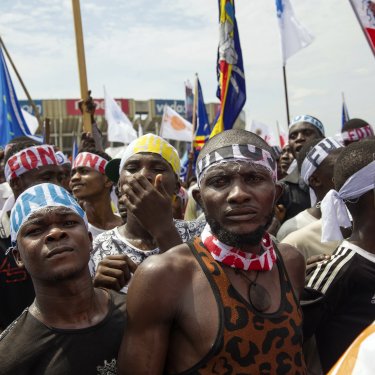At least 15 journalists arrested during DRC demonstrations

Reporters Without Borders (RSF) condemns the arrests of at least 15 journalists in various cities in the Democratic Republic of Congo yesterday while covering demonstrations to demand the publication of an election calendar. Some of the journalists were physically attacked.
The demonstrations were called by civic society groups to press the authorities to publish a calendar for elections, as envisaged in accords reached last December under which President Joseph Kabila is supposed to stand down.
Demonstrations have been banned for the past year and the security forces dispersed yesterday’s with the help of a great deal of teargas and, according to some sources, live rounds. Most of the detained journalists were eventually released but their photos and videos were usually deleted first.
“We firmly condemn this police crackdown, which did not spare journalists who were just doing their job, said Tshivis T. Tshivuadi, the secretary-general of Journalist in Danger (JED), an RSF partner organization. We call on the newly appointed police chiefs to respect, and to ensure that their personnel respect, the work of journalists during political demonstrations.”
The BBC’s Lei Wera, Radio France Internationale’s Swahili correspondent, Daniel Chube Ngorombi, and Justin Kabunga of Congo Synthèse were arrested in Goma along with a photographer who was not identified and were held for two hours. The police temporarily confiscated Wera’s camera and sound recorder and deleted what she had recorded.
In Bukavu, police used violence to arrest reporter Nino Esther and cameraman Christian Safari, who work for Canal Futur, a TV channel owned by opposition politician Vital Kamerhe. The police took them to an unidentified location and forced them delete all their video footage before releasing them.
Seven journalists working for VoxCongo, Radio Okapi and the Xinhua and Anadolu news agencies were arrested in Kinshasa, were subjected to intimidation and were confined in a school yard until released after Kinshasa’s new police chief, Gen. Sylvano Kasongo Kitenge, intervened.
RSF has just learned that two other journalists, Merveille Kakule of Radio Soleil and Georges Kisando of Graben university radio, were harassed and manhandled in the northeastern city of the Butembo and their equipment was confiscated.
“The sole aim of these arrests was to prevent the journalists from doing their job and covering what were historic events for the DRC, said Clea Kahn-Sriber, the head of RSF’s Africa desk. The crackdown was part of the government’s attempts to suppress all democratic discourse. These attempts must stop now.”
Ever since January 2015, when the National Assembly passed an electoral law amendment allowing the authorities to postpone elections originally envisaged for November 2016, journalists have been the targets of violence and intimidation when trying to cover discontent with this decision.
RSF and JED issued a joint release last week condemning the government’s decision to restrict the movements of foreign reporters. In June, RFI reported that the authorities had not renewed the accreditation of its Kinshasa-based correspondent, Sonia Rolley.
The DRC has seen a constant declined in media freedom for the past ten years and is ranked 154th out of 180 countries in RSF’s 2017 World Press Freedom Index.



